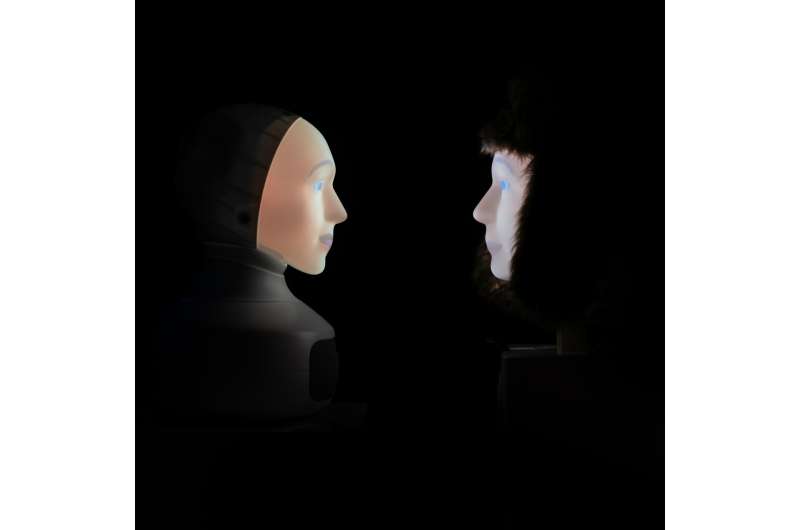February 19, 2019 feature
Evaluating robots as teachers or partners in language learning exercises

Researchers at the Royal Institute of Technology (KTH) in Sweden have carried out a study exploring the effects of using physical robots to assist humans during vocabulary learning exercises. The department of Speech, Music and Hearing at KTH specializes in interdisciplinary research about a broad range of topics, including robotics and computer-assisted language learning.
Physical robots could have a broad range of applications, in areas such as healthcare, transportation, manufacturing, customer service and even education. Recently, researchers at Yale University have investigated whether using robots as tutors instead of on-screen characters or disembodied voices could enhance students' understanding of curricular material.
"We were aware of the work done by Brian Scassellati and his colleagues at Yale where they had subjects do the same cognitive task in three different conditions, and we were curious if it was possible to get the same effects in the domain of vocabulary learning," Preben Wik, one of the researchers who carried out the recent study, told TechXplore. "We proposed the setup as a thesis project for a master student Andreas Wedenborn, who later implemented the experiment."
The primary objective of the study carried out by Wik, Wedenborn and their colleagues was to examine the effect of embodiment, or differences in embodiment of the teacher (i.e. physical robot vs. disembodied voice), on a vocabulary recall test performed by a group of students. The researchers asked 15 human students to learn a number of words in Russian with the assistance of a virtual partner, which was either a disembodied voice, an animated avatar on a computer screen or a physical robotic head with a 3-D animated face mask.
The students who participated in the study had no prior knowledge of the Russian language. Each student took part in a simple interactive language learning exercise, during which they were taught nine Russian words in sets of three. For each set of three words, they had a different virtual teacher or exercise partner.
Once the learning exercise was complete, participants were asked to recall the words that they had previously learned. Their responses were recorded and analyzed to determine whether they performed better on words learned with a particular exercise partner (i.e. the disembodied voice, animated avatar or physical robot).
The researchers found that participants recalled words learned with the robot significantly better than those learned with an avatar and disembodied voice. In addition, recall was better for words learned with the avatar than for those learned when only assisted by a disembodied voice.

"Our paper is reporting the findings of a small study, so it is too early to draw any strong conclusions from it," Wik said. "I think, however, that our findings are very interesting and intriguing. There are indeed significant differences between the recall of vocabulary in the three conditions. One seems to learn better from a robot than from an avatar on a screen. Vocabulary recall is, of course, just one aspect of language learning, but similar studies have been done in other domains."
The findings collected by Wik and his colleagues highlight the potential benefits of using robots as partners during language learning exercises. However, as their study only involved a small number of participants, it might need to be replicated on a larger scale in order to yield more reliable results.
Moreover, the observed better recall for words practiced with a robot could be a mere novelty effect that wears off in time. It could also be associated with the time participants spent on the learning task, as they ended up spending more time with the robot than with other virtual partners.
"One can also speculate that perhaps 'embodiment' is more important in learning than we have previously understood," Wik said. "Perhaps some part of our brain that is used in learning is activated by physical embodiment? Perhaps we are biologically or culturally wired for learning language through physical social interaction, after millennia of interacting that way."
Despite the interesting nature of the findings collected by Wik and his colleagues, further research is needed to better understand the extent of their significance. Future studies could also compare virtual learning partners with human ones, to assess whether face-to-face human interaction can enhance learning.
"I would love to see the study expanded, both over time and across subjects, but also with one condition using a human teacher," Wik said. "If the physical presence of a teacher will boost learning performance, then we should think carefully about the current trend of giving each child a computer, if it is done at the expense of time with a teacher."
The researchers are now planning to continue their research into robotics and computer-assisted learning. One of the authors of the paper, Olov Engwall, is currently working on a project called Collaborative Robot-Assisted Language Learning (CORALL). Wik and another researcher involved in the study have also co-founded a company called Furhat Robotics, specialized in social robotics R&D.
"Social robotics is a broader research area where advances that are made will be beneficial for many verticals, including language learning," Wik explained. "Improved and more natural social interaction using more non-verbal cues and improved turn-taking will also benefit the applications built on top of the more general abilities. Ed-tech is likely to become an area where social robotics will be active."
More information: The effect of a physical robot on vocabulary learning. arXiv:1901.10461[cs.HC]. arxiv.org/abs/1901.10461
olovengwall.wordpress.com/2016 … -the-corall-project/
The physical presence of a robot tutor increases cognitive learning gains. www.researchgate.net/publicati … itive_Learning_Gains
www.furhatrobotics.com/
© 2019 Science X Network





















